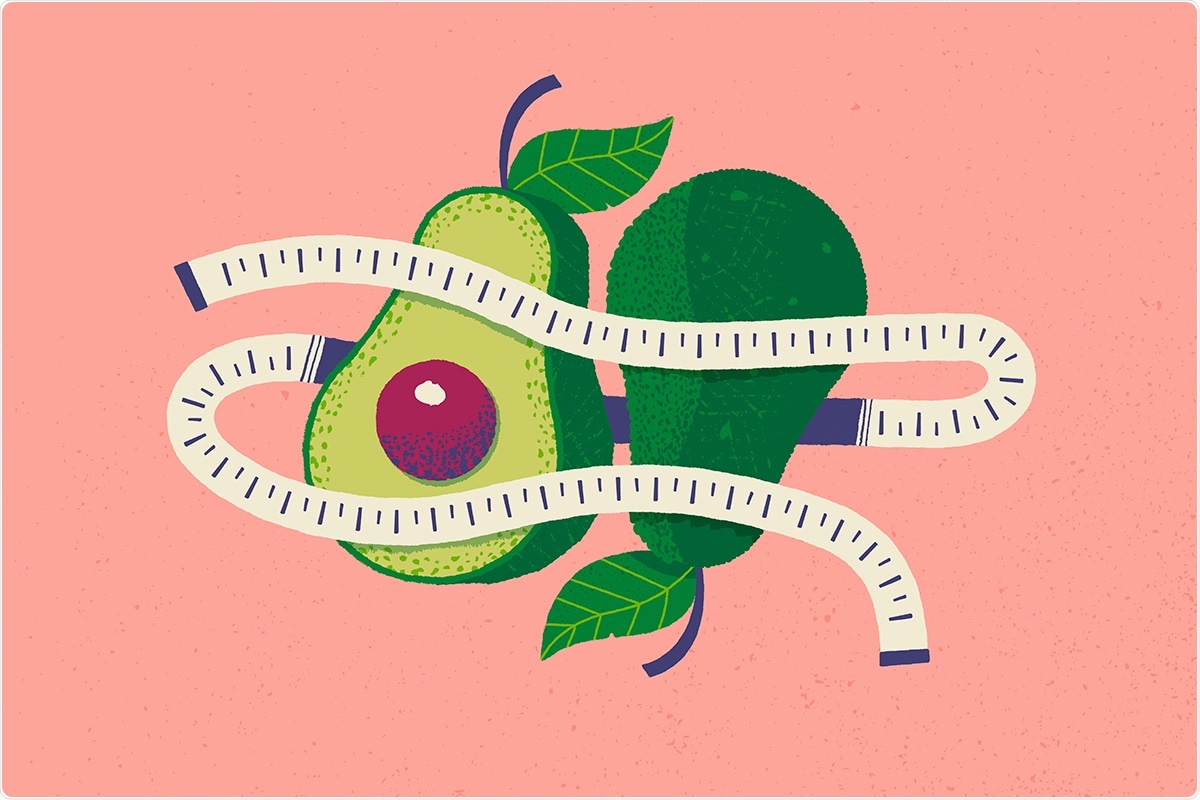According to new research by the University of Illinois Urbana-Champaign and associates, an avocado a day can redistribute belly fat in women toward a healthier profile.

A diet that included an avocado a day reduced visceral belly fat in women in a randomized controlled study of adults with overweight and obesity. Image Credit: Graphic by Michael Vincent.
A total of 105 adults with obesity and overweight took part in a randomized controlled trial that offered a meal a day for 12 weeks. Women who took avocado as part of their daily meal showed a reduction in deeper visceral abdominal fat.
The research was headed by Naiman Khan, an Illinois professor of kinesiology and community health. The scientists published their research, funded by the Hass Avocado Board, in the Journal of Nutrition.
The goal wasn’t weight loss; we were interested in understanding what eating an avocado does to the way individuals store their body fat. The location of fat in the body plays an important role in health.”
Naiman Khan, Professor, Kinesiology and Community Health, University of Illinois at Urbana-Champaign
“In the abdomen, there are two kinds of fat: fat that accumulates right underneath the skin, called subcutaneous fat, and fat that accumulates deeper in the abdomen, known as visceral fat, that surrounds the internal organs,” added Professor Khan.
Individuals with a higher proportion of that deeper visceral fat tend to be at a higher risk of developing diabetes. So we were interested in determining whether the ratio of subcutaneous to visceral fat changed with avocado consumption.”
Naiman Khan, Professor, Kinesiology and Community Health, University of Illinois at Urbana-Champaign
The participants were separated into two groups. One group was offered meals that included a fresh avocado, while the other group was offered a meal that included almost identical ingredients and similar calories but did not include avocado.
The scientists measured the participants’ abdominal fat and their glucose tolerance—a measure of metabolism and a marker of diabetes—at the start and end of the 12 weeks.
Female participants who took an avocado a day as part of their meal exhibited a reduction in visceral abdominal fat—the hard-to-target fat linked with greater risk—and showed a reduction in the ratio of visceral fat to subcutaneous fat. This points to a redistribution of fat away from the organs. However, the distribution of fat in males remained unchanged, and both females and males did not show improvements in glucose tolerance.
“While daily consumption of avocados did not change glucose tolerance, what we learned is that a dietary pattern that includes an avocado every day impacted the way individuals store body fat in a beneficial manner for their health, but the benefits were primarily in females,” said Khan.
He further stated, “It’s important to demonstrate that dietary interventions can modulate fat distribution. Learning that the benefits were only evident in females tells us a little bit about the potential for sex playing a role in dietary intervention responses.”
The scientists intend to carry out a follow-up study that would offer the participants all their daily meals and analyze additional markers of physical and gut health to obtain a greater understanding of the metabolic effects of avocado consumption and to identify if the difference exists between males and females.
Our research not only sheds a valuable light on benefits of daily avocado consumption on the different types of fat distribution across genders, it provides us with a foundation to conduct further work to understand the full impact avocados have on body fat and health.”
Richard Mackenzie, Study Co-Author and Professor, Human Metabolism, University of Roehampton
“By taking our research further, we will be able to gain a clearer picture into which types of people would benefit most from incorporating avocados into their diets and deliver valuable data for health care advisers to provide patients with guidance on how to reduce fat storage and the potential dangers of diabetes,” concludes Mackenzie.
Source:
Journal reference:
Khan, N. A., et al. (2021) Avocado Consumption, Abdominal Adiposity, and Oral Glucose Tolerance Among Persons with Overweight and Obesity. The Journal of Nutrition. doi.org/10.1093/jn/nxab187.